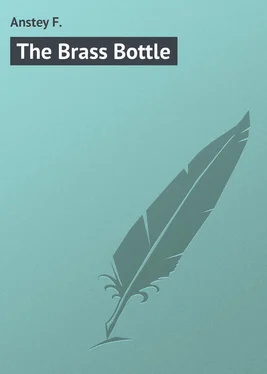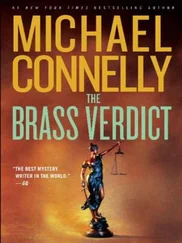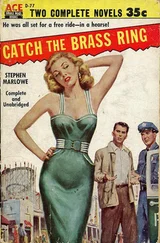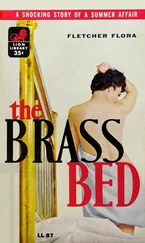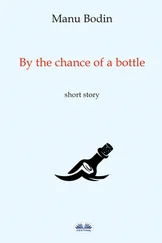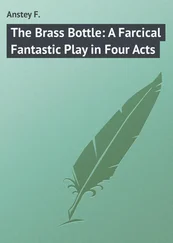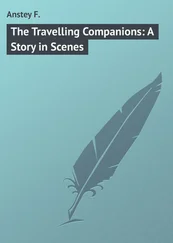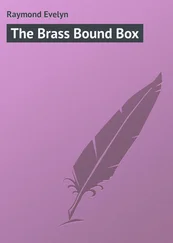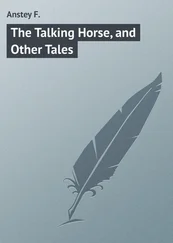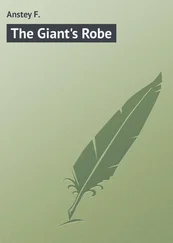F. Anstey - The Brass Bottle
Здесь есть возможность читать онлайн «F. Anstey - The Brass Bottle» — ознакомительный отрывок электронной книги совершенно бесплатно, а после прочтения отрывка купить полную версию. В некоторых случаях можно слушать аудио, скачать через торрент в формате fb2 и присутствует краткое содержание. Жанр: foreign_prose, на английском языке. Описание произведения, (предисловие) а так же отзывы посетителей доступны на портале библиотеки ЛибКат.
- Название:The Brass Bottle
- Автор:
- Жанр:
- Год:неизвестен
- ISBN:нет данных
- Рейтинг книги:3 / 5. Голосов: 1
-
Избранное:Добавить в избранное
- Отзывы:
-
Ваша оценка:
- 60
- 1
- 2
- 3
- 4
- 5
The Brass Bottle: краткое содержание, описание и аннотация
Предлагаем к чтению аннотацию, описание, краткое содержание или предисловие (зависит от того, что написал сам автор книги «The Brass Bottle»). Если вы не нашли необходимую информацию о книге — напишите в комментариях, мы постараемся отыскать её.
The Brass Bottle — читать онлайн ознакомительный отрывок
Ниже представлен текст книги, разбитый по страницам. Система сохранения места последней прочитанной страницы, позволяет с удобством читать онлайн бесплатно книгу «The Brass Bottle», без необходимости каждый раз заново искать на чём Вы остановились. Поставьте закладку, и сможете в любой момент перейти на страницу, на которой закончили чтение.
Интервал:
Закладка:
F. Anstey
The Brass Bottle
CHAPTER I
"This day six weeks – just six weeks ago!" Horace Ventimore said, half aloud, to himself, and pulled out his watch. "Half-past twelve – what was I doing at half-past twelve?"
As he sat at the window of his office in Great Cloister Street, Westminster, he made his thoughts travel back to a certain glorious morning in August which now seemed so remote and irrecoverable. At this precise time he was waiting on the balcony of the Hôtel de la Plage – the sole hostelry of St. Luc-en-Port, the tiny Normandy watering-place upon which, by some happy inspiration, he had lighted during a solitary cycling tour – waiting until She should appear.
He could see the whole scene: the tiny cove, with the violet shadow of the cliff sleeping on the green water; the swell of the waves lazily lapping against the diving-board from which he had plunged half an hour before; he remembered the long swim out to the buoy; the exhilarated anticipation with which he had dressed and climbed the steep path to the hotel terrace.
For was he not to pass the whole remainder of that blissful day in Sylvia Futvoye's society? Were they not to cycle together (there were, of course, others of the party – but they did not count), to cycle over to Veulettes, to picnic there under the cliff, and ride back – always together – in the sweet-scented dusk, over the slopes, between the poplars or the cornfields glowing golden against a sky of warm purple?
Now he saw himself going round to the gravelled courtyard in front of the hotel with a sudden dread of missing her. There was nothing there but the little low cart, with its canvas tilt which was to convey Professor Futvoye and his wife to the place of rendezvous .
There was Sylvia at last, distractingly fair and fresh in her cool pink blouse and cream-coloured skirt; how gracious and friendly and generally delightful she had been throughout that unforgettable day, which was supreme amongst others only a little less perfect, and all now fled for ever!
They had had drawbacks, it was true. Old Futvoye was perhaps the least bit of a bore at times, with his interminable disquisitions on Egyptian art and ancient Oriental character-writing, in which he seemed convinced that Horace must feel a perfervid interest, as, indeed, he thought it politic to affect. The Professor was a most learned archæologist, and positively bulged with information on his favourite subjects; but it is just possible that Horace might have been less curious concerning the distinction between Cuneiform and Aramæan or Kufic and Arabic inscriptions if his informant had happened to be the father of anybody else. However, such insincerities as these are but so many evidences of sincerity.
So with self-tormenting ingenuity Horace conjured up various pictures from that Norman holiday of his: the little half-timbered cottages with their faded blue shutters and the rushes growing out of their thatch roofs; the spires of village churches gleaming above the bronze-green beeches; the bold headlands, their ochre and yellow cliffs contrasting grimly with the soft ridges of the turf above them; the tethered black-and-white cattle grazing peacefully against a background of lapis lazuli and malachite sea, and in every scene the sensation of Sylvia's near presence, the sound of her voice in his ears. And now?.. He looked up from the papers and tracing-cloth on his desk, and round the small panelled room which served him as an office, at the framed plans and photographs, the set squares and T squares on the walls, and felt a dull resentment against his surroundings. From his window he commanded a cheerful view of a tall, mouldering wall, once part of the Abbey boundaries, surmounted by chevaux-de-frise , above whose rust-attenuated spikes some plane trees stretched their yellowing branches.
"She would have come to care for me," Horace's thoughts ran on, disjointedly. "I could have sworn that that last day of all – and her people didn't seem to object to me. Her mother asked me cordially enough to call on them when they were back in town. When I did – "
When he had called, there had been a difference – not an unusual sequel to an acquaintanceship begun in a Continental watering-place. It was difficult to define, but unmistakable – a certain formality and constraint on Mrs. Futvoye's part, and even on Sylvia's, which seemed intended to warn him that it is not every friendship that survives the Channel passage. So he had gone away sore at heart, but fully recognising that any advances in future must come from their side. They might ask him to dinner, or at least to call again; but more than a month had passed, and they had made no sign. No, it was all over; he must consider himself dropped.
"After all," he told himself, with a short and anything but mirthful laugh, "it's natural enough. Mrs. Futvoye has probably been making inquiries about my professional prospects. It's better as it is. What earthly chance have I got of marrying unless I can get work of my own? It's all I can do to keep myself decently. I've no right to dream of asking any one – to say nothing of Sylvia – to marry me. I should only be rushing into temptation if I saw any more of her. She's not for a poor beggar like me, who was born unlucky. Well, whining won't do any good – let's have a look at Beevor's latest performance."
He spread out a large coloured plan, in a corner of which appeared the name of "William Beevor, Architect," and began to study it in a spirit of anything but appreciation.
"Beevor gets on," he said to himself. "Heaven knows that I don't grudge him his success. He's a good fellow – though he does build architectural atrocities, and seem to like 'em. Who am I to give myself airs? He's successful – I'm not. Yet if I only had his opportunities, what wouldn't I make of them!"
Let it be said here that this was not the ordinary self-delusion of an incompetent. Ventimore really had talent above the average, with ideals and ambitions which might under better conditions have attained recognition and fulfilment before this.
But he was not quite energetic enough, besides being too proud, to push himself into notice, and hitherto he had met with persistent ill-luck.
So Horace had no other occupation now but to give Beevor, whose offices and clerk he shared, such slight assistance as he might require, and it was by no means cheering to feel that every year of this enforced semi-idleness left him further handicapped in the race for wealth and fame, for he had already passed his twenty-eighth birthday.
If Miss Sylvia Futvoye had indeed felt attracted towards him at one time it was not altogether incomprehensible. Horace Ventimore was not a model of manly beauty – models of manly beauty are rare out of novels, and seldom interesting in them; but his clear-cut, clean-shaven face possessed a certain distinction, and if there were faint satirical lines about the mouth, they were redeemed by the expression of the grey-blue eyes, which were remarkably frank and pleasant. He was well made, and tall enough to escape all danger of being described as short; fair-haired and pale, without being unhealthily pallid, in complexion, and he gave the impression of being a man who took life as it came, and whose sense of humour would serve as a lining for most clouds that might darken his horizon.
There was a rap at the door which communicated with Beevor's office, and Beevor himself, a florid, thick-set man, with small side-whiskers, burst in.
"I say, Ventimore, you didn't run off with the plans for that house I'm building at Larchmere, did you? Because – ah, I see you're looking over them. Sorry to deprive you, but – "
Читать дальшеИнтервал:
Закладка:
Похожие книги на «The Brass Bottle»
Представляем Вашему вниманию похожие книги на «The Brass Bottle» списком для выбора. Мы отобрали схожую по названию и смыслу литературу в надежде предоставить читателям больше вариантов отыскать новые, интересные, ещё непрочитанные произведения.
Обсуждение, отзывы о книге «The Brass Bottle» и просто собственные мнения читателей. Оставьте ваши комментарии, напишите, что Вы думаете о произведении, его смысле или главных героях. Укажите что конкретно понравилось, а что нет, и почему Вы так считаете.
